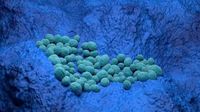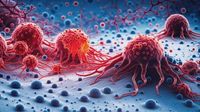In a groundbreaking discovery, researchers at the Otto von Guericke University in Magdeburg have successfully synthesized Disorazol Z1, a potent compound previously found only in nature. This promising substance has shown significant potential in combating cancer by preventing the growth and division of both human and animal cells. The achievement marks a significant milestone in cancer research, as the team led by Chemist Professor Dieter Schinzer has managed to replicate a compound that is naturally produced by myxobacteria, which are often found in organic waste such as goat manure.
Disorazol Z1 is recognized for its high cytotoxicity, meaning it can effectively inhibit cell division and destroy cancer cells. Traditionally, this compound has only been available in minuscule quantities, measured in picomolar concentrations, which are twelve zeros behind the decimal point. For safety reasons, the researchers only synthesized approximately two milligrams of the substance during their experiments.
Professor Schinzer highlighted the significance of this advancement, stating, "We have imitated nature, but with a crucial advantage. Bacteria produce Disorazol Z1 only in a specific form; we can modify it intentionally and optimize it for medical applications." This ability to tailor the compound opens new avenues for targeted cancer therapies.
The researchers plan to alter the molecule so that it can attach to specific proteins, such as antibodies. This modification would allow Disorazol Z1 to be directed precisely to tumor sites, where it could be released to selectively inhibit tumor cell division. Schinzer explained, "The cell death—known as apoptosis—will only occur where it is desired." This targeted approach aims to ensure that healthy cells are largely spared from the effects of the treatment.
The synthetic production of Disorazol Z1 is heralded as a major breakthrough for the field of cancer research. According to Schinzer, the chemical synthesis not only allows for greater availability of the compound but also provides the opportunity to enhance its biological properties for therapeutic use. "We have developed innovative strategies to construct the molecule in several steps, employing cutting-edge chemical techniques and analytical methods to confirm the exact structure of the synthesized compound," he added.
Looking ahead, the research team is eager to patent their discovery and publish their findings. They are also committed to continuing their investigations into the medical applicability of Disorazol Z1 and optimizing the synthesis process for potential industrial applications. The collaboration with industry partners is intended to further develop the substance to ensure it effectively targets cancer cells while minimizing harm to healthy tissues.
This discovery not only represents a leap forward in cancer treatment options but also reflects the ongoing efforts of scientists to harness natural compounds for therapeutic purposes. As the team at the Otto von Guericke University continues their work, the hope is that Disorazol Z1 may one day play a crucial role in the fight against cancer.







